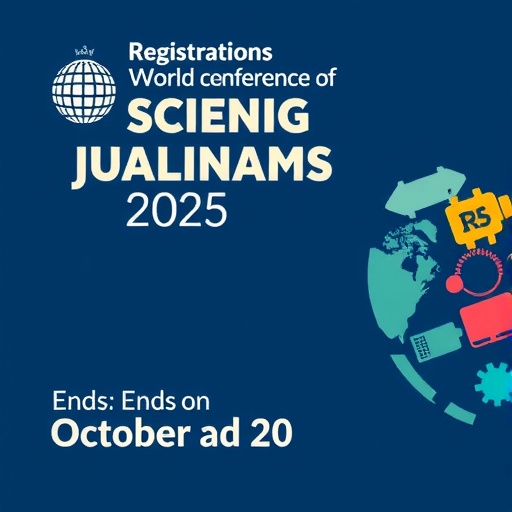The World Conference of Science Journalists 2025 is set to be a landmark event, bringing together science journalists from across the globe to Pretoria, South Africa, from December 1 to 5, 2025. With early bird registration closing on October 20, attendees have a limited window to secure participation at significantly reduced rates of up to 53%. This biennial conference represents an unparalleled opportunity for science reporters to enhance their craft, exchange critical insights, and collectively explore the challenges and innovations shaping science communication today.
Science journalism plays an indispensable role in society by bridging the gap between complex scientific research and the understanding of the general public. In an era characterized by rapid technological advancements and an unprecedented flow of information, the role of science journalists is more crucial than ever. The WCSJ 2025 arrives at a pivotal moment where science faces threats from increasing governmental protectionism, misinformation challenges, and constrained funding environments. These pressures necessitate a global dialogue among journalists dedicated to transparent, accurate, and impactful science reporting.
This edition of the World Conference of Science Journalists marks the first occasion that the event will be hosted on the African continent, signaling a significant milestone for inclusive representation in global science discourse. South Africa’s Pretoria will serve as a vibrant hub for knowledge exchange, offering a unique geographical and cultural context that underscores the conference’s thematic focus on social justice in science journalism. This localization on the African continent highlights the growing importance of diverse perspectives in science media, especially from regions that have historically been underrepresented in global science narratives.
The overarching theme, “Science journalism and social justice: journalism that builds understanding and resilience,” underscores the event’s commitment to advancing equitable and responsible science communication. The intersection of media, science, and social justice invites participants to examine how journalism can contribute to societal resilience by fostering public understanding of climate change, healthcare crises, and other critical global issues. By focusing on social justice, the conference aims to inspire science journalists to consider ethical dimensions in their reporting and to explore the implications of scientific developments on marginalized communities.
Programmatically, WCSJ 2025 offers a comprehensive schedule featuring over 200 speakers, including renowned experts, seasoned journalists, and emerging voices in the science journalism arena. Discussions will cover the evolving landscape of the profession, with emphasis on combating misinformation and adapting to the revolutionary impact of artificial intelligence on newsrooms worldwide. These panels will delve into AI’s potential to both aid and complicate journalistic responsibilities, encompassing challenges such as verifying automated content, maintaining editorial integrity, and addressing algorithmic biases.
Workshops form a critical part of the conference framework, focusing on essential journalistic skills that extend beyond traditional science reporting techniques. Participants can expect sessions on opinion writing, effective mediation between scientific sources and audiences, crafting compelling pitch proposals to editors, and strategies for identifying and counteracting fake news. These training modules are designed to equip journalists with practical tools necessary to thrive in a rapidly transforming media ecosystem, thus ensuring that science news remains credible and engaging for diverse audiences.
An innovative component of WCSJ 2025 involves on-site field trips to prominent South African research institutions. These visits afford journalists direct access to cutting-edge scientific projects and enable them to develop nuanced stories tailored to their specialized beats. Such experiential learning opportunities are invaluable for deepening journalists’ understanding of local and regional scientific endeavors and fostering networks that transcend national borders, thus enriching global science communication.
Ben Deighton, President of the World Federation of Science Journalists (WFSJ) and managing editor of SciDev.Net, emphasizes the critical timing of this conference. Deighton highlights the global trend of increasing governmental restrictions on scientific information, which jeopardizes scientific advancement and public trust. He underscores that the role of science journalists is not merely informative but essential in advocating for transparency and supporting democratic engagement on science-related issues.
The conference is supported by a consortium of reputable organizations including the South African Department of Science, Technology & Innovation (DSTI), the Science Diplomacy Capital of Africa, Gauteng Tourism, the City of Tshwane, and the South African National Convention Bureau. Notable international partners such as EurekAlert!, SciDev.Net, the Association of British Science Writers, and Springer Nature also lend their support, reflecting the broad institutional backing and the global significance of the event.
Travel grants have been introduced to democratize access to the conference, aiming to overcome financial and logistical barriers that may preclude participation, particularly from journalists in under-resourced contexts. This inclusive approach ensures that a wide array of voices and perspectives are represented, which is vital for cultivating a holistic understanding of science communication challenges and opportunities worldwide.
As the conference approaches, prospective attendees and interested parties are encouraged to visit the official WCSJ 2025 website or contact the media representative Zamuxolo Matiwana at info@wcsj2025.org for detailed information regarding registration, the program, travel grants, and logistical arrangements. This proactive engagement is necessary to participate in an event poised to shape the future trajectory of science journalism and to strengthen the role of the media in fostering informed, resilient societies.
Science journalism is navigating an unprecedented juncture marked by technological innovation, expanding misinformation, and evolving societal needs. The World Conference of Science Journalists 2025 offers a timely, dynamic platform for confronting these challenges collaboratively, equipping journalists with the skills, insights, and networks essential to invigorate science communication in the years to come. With its unique African setting and forward-looking agenda, WCSJ 2025 represents not just a conference but a global call to action for science journalism committed to social justice and public engagement.
Subject of Research: Science Journalism, Science Communication, Social Justice in Media
Article Title: World Conference of Science Journalists 2025: Advancing Science Journalism on African Soil
News Publication Date: Not specified
Web References: http://www.wcsj2025.org, http://scidev.net, https://wfsj.org/
Keywords: Science journalism, Science communication, Social justice, Misinformation, Artificial Intelligence, Science media, Journalism skills, African science research




